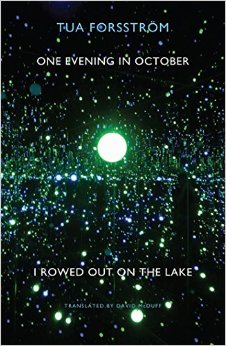One Evening In October I Rowed Out On The Lake by Tua Forsström, translated by David McDuff
– Reviewed by Becky Varley–Winter –
In One Evening In October I Rowed Out On The Lake (En Kväll I Oktober Rodde Jag Ut På Sjön), Tua Forsström quotes Einstein:
When the expected course of everyday life is interrupted,
we are like shipwrecked people on a miserable plank
in the open sea, having forgotten where they come from
and not knowing whither they are drifting.
Gravitating around this experience of unnamed shock and dislocation, Forsström’s collection is almost a pamphlet in length, but feels bigger due to David McDuff’s parallel translation, which doubles it. I don’t know any Swedish, but his English versions of Forrström’s poems feel crisp, clear and fresh, and I trace Swedish words across the page: ‘regnet’ (the rain) looks like regret; ‘kvall’ (evening) like skull and knife.
Poems aren’t separated by titles, making the collection feel like one long poem or sequence using repeated lines, themes and motifs. It begins:
The darkness, the rain, the kindness
An evening with roses that sink to the bottom
slowly a frozen street in Mejlans a perfectly ordinary evening
This is set at the foot of the page rather than the top, as if there is a long silence, or as if words have sunk down, like the roses, into silt. ‘The darkness, the rain, the kindness’ repeats through the collection, as do flowers, and water. It’s hypnotic: I don’t notice the repetition immediately, the same words in shifting configurations that submerge you deeper into the ‘evening’ at the heart of the book, time weaving thickly back on itself. Punctuation is scarce, adding to this floating, disconnected feeling.
The next section is mysterious, ‘like a dream but I wasn’t dreaming’:
At the forest’s edge some aggressive act has taken place
There is a lukewarm smell when people and animals are slaughtered
The ‘aggressive act’ is deliberately oblique, a ghost of slaughter or threat of slaughter. This section includes the line ‘you have caused the council considerable expense’, suggesting protest or sabotage of a slaughterhouse, perhaps, but it’s not explicit enough to be sure. Feelings, such as fear, are relatively clear; what is ‘really happening‘ in the poems is subordinate to this emotional sense. Wolves track through (out of the ‘forest’s edge’?), a displacement of the heart’s own wildness and restlessness, following ‘One another’s tracks through the heart the snow’. Conventional syntax is disrupted, perhaps to make dreamlike imagery lift off the page in a more uninhibited way amid the speaker’s cramped yearning (‘The flat is very small’).
Occasionally a poem unfurls dramatically and expansively. Loose recurring themes run through the collection, as well as explicit repetition; a poem on Houdini evokes underwater escape acts, tying into longer threads of confinement and immersion:
A green-shimmering light above
Stockholm, as if we were inside the ice.
Forsström hints at sources for this isolation: one poem appears to be about separation or divorce, with direct lines such as ‘I miss you so much’ and ‘It is hard to assess the extent of the damage’ amid more allusive moments. An elegy perhaps, but the ‘you’ seems to be living. Forsström tends to keep some specifics hidden, without being too reticent: ‘We are drawn to everything that / possesses a secret.’ At times this mysterious atmosphere reminds me of the ‘hyacinth girl’ in T. S. Eliot’s The Waste Land:
Your arms full, and your hair wet, I could not
Speak, and my eyes failed, I was neither
Living nor dead, and I knew nothing,
Looking into the heart of light, the silence.
There is comparable sensuality and silence in Forsström’s work, both transcendent and grounded, even featuring a ‘mute princess’ with a parallel role to Eliot’s hyacinth girl:
A mute princess takes you by the hand
Lilies braided in her hair and buckle of nacre, darkening
chrysanthemums
Her poems feel skilled but not overtly crafted, with an apparent simplicity that relaxes me into their often abrupt shifts from one topic to the next, their syntactical games. This experimentation feels natural rather than ostentatious, much like the way the mind works, jumping from the transcendent to the practical:
Mantegna wrote below his last painting:
‘Nothing but God endures, the rest is smoke…’
We will spend the weekend with some friends
I am looking forward to it.
Replicating rhyme-schemes in translation is incredibly difficult, unless you sacrifice sense to sound. I can see that Forsström’s Swedish lines make some use of rhyme and assonance, such as in the line endings varda/vanliga/violetta, but these translate as value/kindly/violet, inevitably not rhyming in the same way. McDuff’s translation often makes use of rhyme, but does so in different positions. To some extent this loosens structure, making specifics blow through my head like smoke; I don’t retain scraps of verse in my head once I’ve finished reading. Yet these poems still make a strong emotional impression. One poignantly portrays the speaker’s dead parents:
I ask if they are homesick
They turn their faces towards me,
seem interestedSeem thin and terribly strong
It’s a density I don’t understandPerhaps they wonder about us
as we laugh and cry unhappily
Although it has moments of velvet darkness, a sombre undertow, there is also a real brightness to this book, full of heartfelt tangible encounters, especially with children and animals. It’s like a vivid dream, in which people and things approach so closely they become part of ourselves.
We feel gratitude when the wild creatures come near
without caring about us
There are pictures that make it possible to see the other,
I do not know whose dream you are in the evenly distributed
darkness and it is raining roses over all creatures
This reminds me of e. e. cummings’ ‘somewhere i have never travelled,gladly beyond’… A journey into the world and the great unknown of other people. After walking (or rowing) through sadness like a fall of snow, Forrström ends with transition, whether into death or a new phase of life: ‘The next chapter’, ‘Nästa kapital’.





